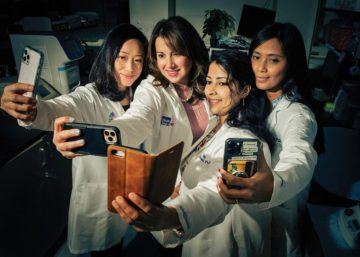Abigail Tucker in Smithsonian:
 “It feels like a grew a new heart.” That’s what my best friend told me the day her daughter was born. Back then, I rolled my eyes at her new-mom corniness. But ten years and three kids of my own later, Emily’s words drift back to me as I ride a crammed elevator up to a laboratory in New York City’s Mount Sinai Hospital, where cardiologists are probing the secrets of maternal hearts. Every year, thousands of pregnant women and just-delivered mothers land in emergency rooms with a life-threatening type of heart failure. Symptoms include swollen neck veins and shortness of breath. Their hearts have a harder time pumping. The underlying cause of this “peripartum cardiomyopathy” is unclear, but it’s the kind of health disaster that, for other people, can end in a heart transplant, or oblivion.
“It feels like a grew a new heart.” That’s what my best friend told me the day her daughter was born. Back then, I rolled my eyes at her new-mom corniness. But ten years and three kids of my own later, Emily’s words drift back to me as I ride a crammed elevator up to a laboratory in New York City’s Mount Sinai Hospital, where cardiologists are probing the secrets of maternal hearts. Every year, thousands of pregnant women and just-delivered mothers land in emergency rooms with a life-threatening type of heart failure. Symptoms include swollen neck veins and shortness of breath. Their hearts have a harder time pumping. The underlying cause of this “peripartum cardiomyopathy” is unclear, but it’s the kind of health disaster that, for other people, can end in a heart transplant, or oblivion.
Yet fate has a different design for fledgling mothers. About 50 percent spontaneously get better, the highest rate of recovery from heart failure for any group. Some maternal hearts are practically as good as new in as little as two weeks. Adult heart tissue doesn’t rally easily, but new mothers may somehow be able to regrow heart cells the way salamanders sprout new tails. At this Mount Sinai Hospital lab, a cardiologist named Hina Chaudhry thinks she has figured out why. In tests involving lab mice, which were surgically operated on to simulate a heart attack, she and her research team discovered something astonishing: heart cells with DNA that doesn’t match the mother’s own. The mystery cells belong to unborn mice. During pregnancy the fetal mouse cells cross the placenta into the mother’s body, joyriding through her blood vessels until cardiac damage happens, at which point they sense inflammation and make a beeline for her wounded heart. The lab has even found that these cells, harvested from mouse placentas, will travel to the damaged hearts of male mice after being artificially implanted in their tails.
“They just zoom in,” says Chaudhry. “These cells home to the heart like heat-seeking missiles.”
More here.
